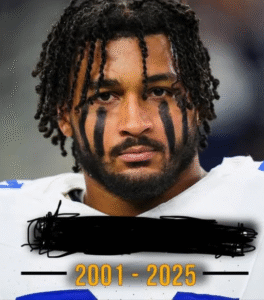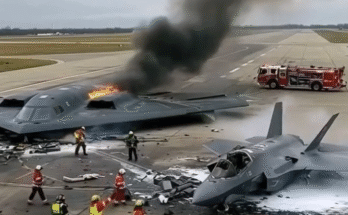The world of professional football—and especially the Dallas Cowboys—has been rocked by heartbreak and sorrow with the tragic passing of 24-year-old defensive end Marshawn Kneeland. His death comes not only as a shock because of his young age and budding career, but also under circumstances that raise urgent questions about mental health, support systems, and the unseen pressures faced by athletes.
A Rising Talent Silenced Too Soon
Kneeland was a second-round draft pick by the Cowboys in 2024 after a standout collegiate career at Western Michigan Broncos. AP News+3The Guardian+3NFL.com+3 He played for the Cowboys beyond his rookie season, and had recently achieved a major career milestone: on November 3, 2025, he recovered a blocked punt and scored his first NFL touchdown. Dallas Cowboys+2EW.com+2 In the best of worlds, this would have been the beginning of great things.
And yet, just days later, his life ended under tragic circumstances. According to police reports, Kneeland was involved in a vehicle incident in the Dallas–Frisco area, where a pursuit took place, after which he fled on foot. He was later located and found deceased from a self-inflicted gunshot wound. AP News+2FOX 4 News Dallas-Fort Worth+2 Compounding the distress was a report that his girlfriend had alerted authorities indicating he was armed and intended to harm himself. AP News+1
The Cowboys’ official statement read:
“It is with extreme sadness that the Dallas Cowboys share that Marshawn was a beloved teammate and member of our organization. Our thoughts and prayers … are with his girlfriend Catalina and his family.” Dallas Cowboys+1
Beyond the Stats: Who He Was
Although his time in the NFL was brief, Kneeland’s character and trajectory spoke volumes. His agent described him as someone who “poured his heart into every snap, every practice and every moment on the field.” NFL.com Teammates, coaches, and college acquaintances remembered him not only for his athletic ability but for his dedication, work ethic, and positive influence.
At Western Michigan, he earned second-team All-MAC honors in 2023, and his statistics and impact marked him as a player on the rise. Wikipedia+1 The NFL community responded with shock and grief—and also a renewed conversation about athlete mental health and unseen struggles.
The Aftermath & Reflections
The death of Marshawn Kneeland has triggered an outpouring of condolences and reflections across the league. For example, the Cowboys’ veteran quarterback Dak Prescott, who himself has publicly spoken about personal loss, shared his heartbreak for Kneeland’s family, his girlfriend, and the team. People.com+1
Meanwhile, the incident underscores how even rising professional athletes are not immune to mental-health crises. The sequence of events—vehicle pursuit, flight, expression of suicidal intent—forces a reckoning: talent and opportunity do not shield against internal struggles. The league and team now are re-emphasizing mental-health resources and support for players. NFL.com+1
What’s at Stake & Why It Matters
For the Cowboys organization, this is far more than losing a member of the roster—it’s losing a young life, a teammate, a friend. The void left in their locker room and hearts is profound. For fans, it is a moment to pause and reflect: the show of lights, helmets, and jerseys conceals human beings with human frailties.
From a broader perspective, Kneeland’s passing is a reminder of several important truths:
-
Mental health doesn’t respect status or prowess. Being in the NFL doesn’t make you immune.
-
Early warning signs matter. Reports suggest Kneeland had communicated intent to harm himself. WFAA
-
Support systems must be robust. Teams, leagues, families, and communities must actively engage—not just react.
-
Loss prompts action. The hope is that the tragedy leads to deeper understanding and improved resources for players at every level.
A Final Farewell
To Marshawn Kneeland’s family, girlfriend Catalina, his teammates, coaches, and the entire Cowboys community—and to the many who knew and admired him—there are no words that adequately express the sadness of his departure. He was only 24 years old. A chapter ended far sooner than anyone expected.
In the face of grief, we might remember him by the simple things: a sack-seeker on the edge, a kid from Michigan who dreamed of the pros, someone who scored his first NFL touchdown and embraced the moment. But most importantly: someone human.
May his memory spur stronger care, safer spaces, and deeper empathy for those who struggle silently. If you—or someone you know—is suffering with suicidal thoughts or in crisis, please reach out for help: in the U.S., dial or text 988 for the Suicide & Crisis Lifeline. AP News+1


